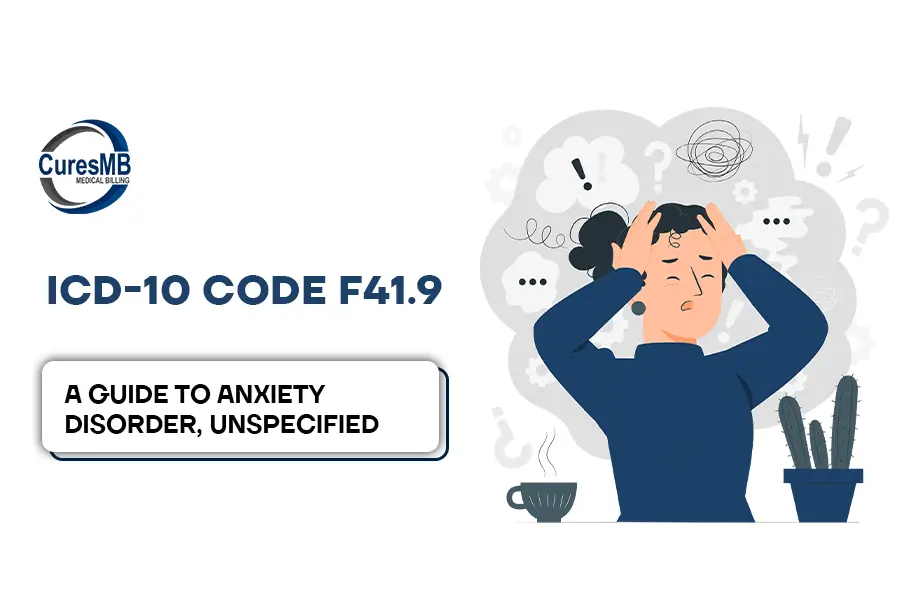
Anxiety disorders are among the most commonly diagnosed mental health conditions worldwide. In the healthcare system, accurate coding is important in ensuring proper documentation, reimbursement, and patient care. One such important code is ICD-10 Code F41.9, used to identify Anxiety Disorder and unspecified cases.
The ICD-10 code F41.9 stands for “Anxiety Disorder, Unspecified,” a diagnosis used when a patient exhibits clear anxiety symptoms that do not meet the full criteria for a more specific anxiety disorder (like Generalized Anxiety Disorder, Panic Disorder, or Social Anxiety).
A patient’s diagnosis under F41.9 may experience one or more of the following symptoms:
These symptoms often vary in intensity and may impact daily activities significantly.
A doctor or mental health professional will:
Our goal is to streamline your healthcare revenue cycle management, give you the financial freedom your practice deserves, and take control with a partner specializing in provider RCM optimization and services excellence.
Access essential company data with a simple click through the 'Download Company Info' feature.
Regular Exercise (30 mins/day reduces cortisol).
Sleep Hygiene (Fix circadian rhythm disruptions).
Limit Caffeine & Alcohol (Both worsen anxiety).
Breathing Exercises (Diaphragmatic breathing for panic symptoms).
Disorder | ICD-10 Code | Key Feature |
Generalized Anxiety Disorder (GAD) | F41.1 | Chronic, excessive worry for ≥6 months |
Panic Disorder | F41.0 | Recurrent panic attacks + fear of more attacks |
Mixed Anxiety & Depression | F41.2 | Symptoms of both but neither fully meets criteria |
Social Anxiety Disorder | F40.1 | Fear of social judgment/humiliation |
Unspecified Anxiety Disorder | F41.9 | Anxiety symptoms present, but no exact classification |
By adhering to coding best practices and looking for support when needed, providers can optimize patient consequences and reimbursement processes. If you’re looking for expert assistance with your medical billing needs, reach out to Cures Medical Billing Services. Let us simplify your practice management while you focus on delivering exceptional care to your patients.
From initial consultations to ongoing billing support, we streamline your workflow so you can focus on what is most to provide exceptional care to your patients.
ICD-10 Code F41.9 refers to Unspecified Anxiety Disorder. In billing, this code is used to represent anxiety symptoms that are clinically significant but do not meet the full criteria of a specific anxiety subtype, such as Generalized Anxiety Disorder (F41.1) or Panic Disorder (F41.0). It is frequently used during initial evaluations or when a provider determines that a generalized anxiety diagnosis is most appropriate but lacks detailed specificity.
Providers may assign F41.9 when the symptoms are clearly related to anxiety but do not fit precisely into another diagnostic category. This can occur during early assessments, in complex cases, or when documentation is limited. It ensures that the patient receives appropriate care and insurance coverage without delay, even while further evaluation is ongoing.
F41.9 is a valid, billable ICD-10-CM diagnosis code accepted by all major payers. When paired with appropriate CPT codes (such as psychiatric evaluations or psychotherapy sessions), it typically supports reimbursement. However, accurate clinical documentation and clear justification for medical necessity are critical for minimizing claim denials.
Not necessarily. F41.9 can be a temporary or preliminary diagnosis. Many clinicians use this code during the diagnostic process and may later update it to a more specific anxiety disorder based on further assessment. From a billing standpoint, updated diagnoses should be reflected in subsequent claims to ensure continuity and accuracy.
For compliant documentation, clinicians should include:
Yes. Patients frequently present with co-occurring conditions such as depression (F32.9), adjustment disorders, or somatic symptoms. When clinically appropriate and properly documented, multiple ICD-10 codes may be used on the same claim. Providers should follow payer-specific guidelines regarding primary and secondary diagnosis order.
Generally, F41.9 does not require modifiers. However, some payers may request prior authorization for ongoing behavioral health services, particularly for extended therapy or medication management. It’s important for billing teams to verify benefits and authorization requirements prior to treatment initiation.
At Curesmb, we specialize in behavioral health billing and offer:
Discover Cures Medical Billing Services Across Different States
FL
NY
ML
CO
NJ
AZ
TX
CA
WA
We are a team of national medical billing service experts based in Astoria, NY, committed to providing ongoing value to our customers. We leverage technology and implement best practices to provide high-quality and cost-efficient medical billing solutions from domestic locations, enabling customers to achieve their business goals. Cures Medical Billing is the best option for any medical billing needs.
Medical billing around Astoria, NY, and beyond is our core competency and our specialists will efficiently manage all your billing needs. Our medical billing specialists have over 12 Plus years of experience with all security technologies to ensure data integrity for our customers. Using our medical billing service, anyone can make their medical billing task less resource-consuming.
Efficiency & precision in healthcare financial management with Cures Medical Billing, your trusted partner for smarter, faster, and more accurate billing solutions.
This site uses cookies. Read our Privacy Policy